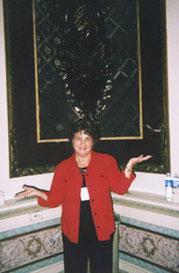September 24, 2018
Mercy Day

The Sisters of Mercy, West Midwest Community, are the primary funders of the Justice Project in Kansas City, a project which works with women who have been trafficked within the United States. A number of Mercy Sisters volunteer at the project, including Sister Donna Ryan, chair of the board.
 |
| Donna Ryan |
The term human trafficking usually conjures up images of women brought to the United States from impoverished nations and forced into prostitution or domestic servitude.
Kris Wade, founder of The Justice Project expands that definition to anyone caught up in sexual exploitation, whether from overseas or from around the corner from where they live. "Transportation has nothing to do with it," she says. "It's a person being used as a commodity, trading sex for a place to stay, a ride or money."
Kris knows about sex trafficking firsthand. She was trafficked as a teenager by a motorcycle gang in Chicago; she was beaten, raped and sold from one pimp to another. Now she works with domestic trafficking victims -- the term she prefers to prostitutes -- caught up in similar situations, whether as youth or adults.
Among her cases were three sisters -- 13-year-old twins and a 15-year-old -- coerced into prostitution by a man who had befriended them. In that case, one of the first to be tried under a federal human trafficking law, local law enforcement officials wanted to place the teens in a juvenile detention facility as criminals until she convinced them the youth were actually victims.
Kris is one of the contributors to a federal report on domestic minor sex trafficking, which is defined as any youth under the age of 18 involved in a commercial sex act. The report looks at 11 regions of the country, including Kansas City. It estimates that at least 100,000 children are used in prostitution each year in the U.S.

Kris, who is a member of an anti-human trafficking coalition in Kansas City, continues educating others about the domestic face of human trafficking. She expresses frustration that adult American victims have to show more proof of force, fraud or coercion than do internationally trafficked victims to receive services instead of jail time. Under federal law, she explains, anyone under 18 is automatically considered a victim.
The Justice Project and Willow Tree outreach and Kris herself have helped more than 150 women providing emotional support, advocacy and navigation of the criminal justice and social service systems to trafficking victims There are over 30 active cases in her files right now: Caucasian, African- American and Hispanic, ages 18-81. Most have substance abuse issues; seven have successfully completed either drug or mental health court programs with Kris’s assistance. Women are referred through street or Willow Tree outreach, the courts, probation and parole, or other agencies. The cases she is working with involve everything from prostitution, drugs, driving violations, domestic violence, sexual assault, foreclosures, child custody, to theft. Four cases are felonies, the rest are misdemeanor charges in four jurisdictions in both Kansas and Missouri. Many clients have more than one issue or charge and they may be tangled up in several jurisdictions.
The peer support provided by the Justice Project and Willow Tree have helped women overcome legal and other system obstacles. Its success can be measured by reductions in the number of arrests, completion of probation and parole requirements, resolution of legal cases, and the obtaining of housing, food stamps and counseling. Armed with these tools, a woman can build a foundation of independence and lift herself out of poverty.